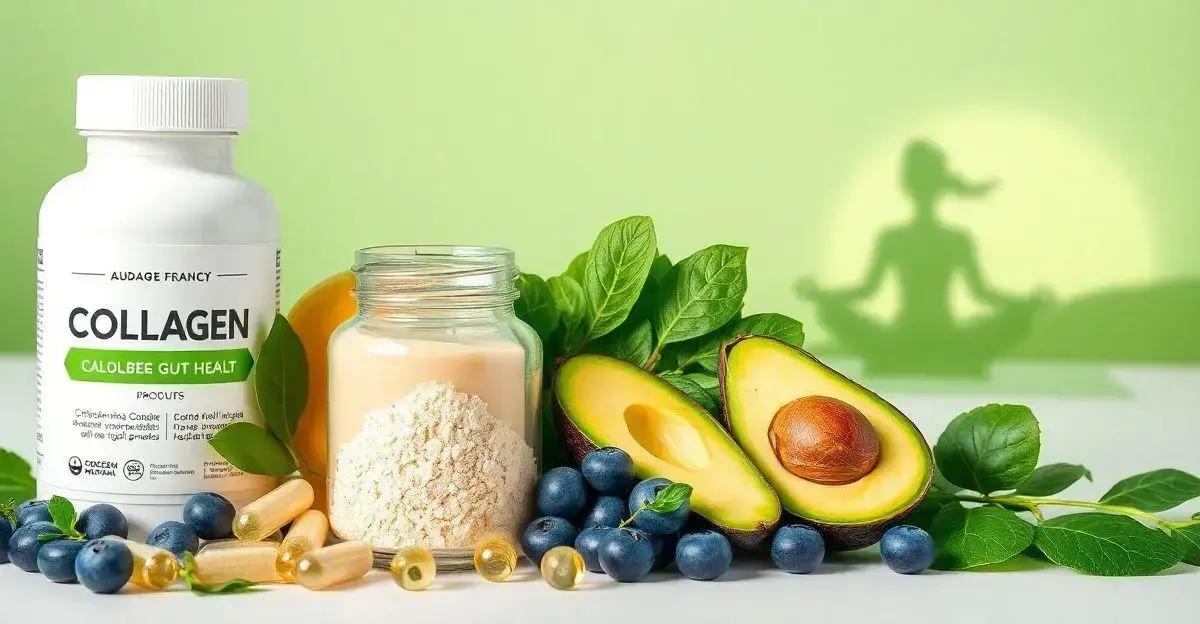Collagen is an essential protein that supports skin health, joint function, and gut integrity. It enhances skin elasticity and hydration while reducing aging signs. For joints, it helps maintain cartilage, alleviating pain and improving mobility. Additionally, collagen strengthens the gut lining, aids digestion, and minimizes inflammation. To boost collagen intake, consider bone broth, supplements, and collagen-rich foods like fish, chicken, and eggs for overall health benefits.
The uses of collagen are becoming increasingly popular as people look for ways to enhance their health and beauty regimens.
From improving skin elasticity to supporting joint health, collagen has numerous benefits that are hard to ignore.
In this article, we will explore the top five amazing uses of collagen and how it can transform your overall well-being.
What is Collagen?
Collagen is a vital protein found in our bodies, making up about 30% of the total protein content. It serves as a building block for our skin, bones, muscles, tendons, and ligaments. Think of it as the glue that holds everything together, providing structure and support.
This protein is composed of amino acids, primarily glycine, proline, and hydroxyproline, which are essential for maintaining the integrity of connective tissues. As we age, our body’s natural collagen production decreases, leading to signs of aging like wrinkles, joint pain, and weakened cartilage.
Collagen is not only crucial for maintaining skin elasticity and hydration but also plays a significant role in joint health by helping to maintain the cartilage that protects our joints. Additionally, it supports muscle mass and contributes to the overall strength and health of our bones.
There are various types of collagen, with Type I being the most abundant, found in skin, tendons, and bones, while Type II is mainly present in cartilage. Understanding the different types can help you choose the right collagen supplements based on your specific health goals.

Benefits of Collagen for Skin
One of the most celebrated benefits of collagen is its positive impact on skin health. As we age, our skin loses collagen, which can lead to wrinkles, sagging, and dryness. Here’s how collagen benefits your skin:
1. Improves Skin Elasticity: Collagen helps maintain skin elasticity, making it firmer and more resilient. Studies show that collagen supplements can improve skin elasticity, reducing the appearance of fine lines and wrinkles.
2. Boosts Hydration: Collagen can enhance skin hydration, which is crucial for a healthy complexion. Hydrated skin appears plumper and more youthful, and collagen helps retain moisture in the skin.
3. Promotes Skin Renewal: Collagen aids in the skin’s natural renewal processes, encouraging the production of new skin cells. This can lead to a more radiant and refreshed appearance.
4. Reduces Signs of Aging: Regular collagen intake has been linked to a decrease in wrinkles and fine lines. It can also help fade age spots, giving your skin a more uniform tone.
5. Supports Wound Healing: Collagen plays a critical role in wound healing, as it accelerates the repair process and helps to form new tissue. This makes it beneficial for recovering from injuries and reducing scars.
Incorporating collagen-rich foods or supplements into your routine can significantly improve your skin’s overall health and appearance, making it a popular choice for those looking to maintain a youthful glow.
How Collagen Supports Joint Health
Collagen is not just for skin; it also plays a crucial role in maintaining joint health. As a primary component of cartilage, collagen helps protect joints and promotes overall mobility. Here are some key ways collagen supports joint health:
1. Maintains Cartilage Integrity: Cartilage is the flexible tissue that cushions joints. Collagen is essential for its structure and resilience, helping to prevent wear and tear that can lead to joint pain and stiffness.
2. Reduces Joint Pain: Studies have shown that collagen supplements can significantly reduce joint pain associated with conditions like osteoarthritis and rheumatoid arthritis. By replenishing collagen levels, you can help alleviate discomfort and improve joint function.
3. Supports Joint Flexibility: Adequate collagen levels contribute to better joint flexibility. This is especially important for athletes and active individuals, as it allows for a greater range of motion and reduces the risk of injuries.
4. Promotes Repair of Joint Tissues: Collagen plays a role in repairing damaged tissues within the joints. This is crucial for recovery from injuries and maintaining long-term joint health.
5. Enhances Overall Mobility: By supporting cartilage and reducing inflammation, collagen improves overall mobility, making it easier to engage in daily activities and enjoy an active lifestyle.
Incorporating collagen into your diet, whether through supplements or collagen-rich foods like bone broth, can be a game-changer for those looking to protect and enhance their joint health.

Collagen and Gut Health
Collagen is gaining recognition for its beneficial effects on gut health. This protein plays a vital role in maintaining the integrity of the gut lining and supporting overall digestive function. Here’s how collagen contributes to a healthier gut:
1. Strengthens Gut Lining: Collagen helps to strengthen the intestinal walls, which can prevent leaks and promote a healthy gut barrier. This is crucial for preventing conditions like leaky gut syndrome, where toxins and undigested food particles can enter the bloodstream.
2. Aids Digestion: Collagen contains amino acids like glycine and proline, which aid in digestion and help to maintain a healthy digestive tract. These amino acids can support the production of stomach acid, improving the breakdown of food.
3. Reduces Inflammation: Collagen can help reduce inflammation in the gut, which is beneficial for individuals suffering from inflammatory bowel diseases (IBD) such as Crohn’s disease and ulcerative colitis. By calming the gut, collagen may alleviate symptoms and promote healing.
4. Supports Healthy Microbiome: A healthy gut microbiome is essential for overall health. Collagen can contribute to a balanced gut environment, supporting the growth of beneficial bacteria while keeping harmful bacteria in check.
5. Promotes Nutrient Absorption: A strong gut lining not only protects against harmful substances but also enhances nutrient absorption. With improved gut health, your body can better absorb vitamins and minerals from the food you consume.
Including collagen in your diet, whether through supplements or collagen-rich foods, can have a positive impact on your gut health, leading to better digestion and overall well-being.
Best Sources of Collagen
When it comes to boosting your collagen intake, choosing the right sources is essential. Here are some of the best sources of collagen to consider:
1. Bone Broth: One of the most popular sources of collagen, bone broth is made by simmering animal bones and connective tissues. This process releases collagen and other beneficial nutrients, making it a nutritious addition to soups and stews.
2. Collagen Supplements: Available in various forms such as powders, capsules, and liquids, collagen supplements are an easy way to increase your intake. Look for hydrolyzed collagen, which is more easily absorbed by the body.
3. Fish and Shellfish: Fish, particularly those with skin, and shellfish are excellent sources of collagen. The collagen found in fish is also known for its ability to support skin health and hydration.
4. Chicken and Turkey: Poultry is rich in connective tissues, making it a great source of collagen. Chicken skin and cartilage, often found in soups or roasted dishes, are particularly high in this protein.
5. Eggs: While eggs don’t contain collagen directly, they are rich in proline, an amino acid that’s crucial for collagen production. Incorporating eggs into your diet can help support your body’s natural collagen synthesis.
6. Dairy Products: Dairy foods like yogurt and cheese contain amino acids that can aid collagen production. Additionally, they provide other essential nutrients that contribute to overall health.
By incorporating these collagen-rich foods into your diet, you can effectively boost your collagen levels and enjoy the numerous benefits for your skin, joints, and overall health.

How to Incorporate Collagen into Your Diet
Incorporating collagen into your diet is easier than you might think! Here are some practical ways to boost your collagen intake:
1. Add Collagen Powder to Your Smoothies: One of the simplest ways to include collagen in your diet is by adding collagen powder to your morning smoothies. It blends seamlessly with fruits, vegetables, and your choice of milk or yogurt, providing a nutritious boost without altering the taste.
2. Use Bone Broth in Cooking: Substitute water or stock with bone broth in soups, stews, and sauces. This not only adds flavor but also enriches your meals with collagen. You can also sip on warm bone broth as a nourishing snack!
3. Bake with Collagen: You can incorporate collagen powder into baked goods like muffins, pancakes, or protein bars. Just replace a small portion of the flour with collagen powder to enhance the nutritional profile.
4. Make Collagen-Infused Beverages: There are many brands of collagen-infused drinks on the market, including flavored waters and ready-to-drink teas. These can be a convenient and tasty way to get your collagen fix.
5. Include More Collagen-Rich Foods: Focus on including more collagen-rich foods in your meals, such as chicken skin, fish with skin, and egg dishes. These foods not only provide collagen but also contribute valuable nutrients to your diet.
6. Experiment with Collagen Recipes: Look for recipes specifically designed to incorporate collagen, like collagen-infused energy bites or desserts. There are many creative ways to enjoy the benefits of collagen while satisfying your sweet tooth!
By incorporating these simple strategies into your daily routine, you can easily increase your collagen intake and enjoy the myriad of health benefits it offers.
Conclusion
Incorporating collagen into your diet can have remarkable benefits for your skin, joints, and gut health.
From improving skin elasticity and hydration to supporting joint integrity and enhancing digestive function, the advantages of collagen are extensive.
By including collagen-rich foods and supplements in your daily routine, you can promote overall well-being and maintain a youthful appearance.
Whether it’s sipping on bone broth, blending collagen powder into smoothies, or enjoying collagen-infused snacks, there are countless ways to enjoy the benefits of this essential protein.
Remember, as with any dietary change, consistency is key to seeing the best results.
So, start incorporating collagen today and unlock the potential for a healthier, happier you!
Frequently Asked Questions about Collagen
What is collagen, and why is it important?
Collagen is a vital protein that provides structure to skin, bones, muscles, and joints. It’s crucial for maintaining skin elasticity and joint health.
How can I increase my collagen intake?
You can increase collagen intake by consuming collagen-rich foods like bone broth, fish, chicken skin, eggs, and by taking collagen supplements.
Does collagen improve skin health?
Yes, collagen helps improve skin elasticity, hydration, and reduces the appearance of wrinkles and fine lines.
Can collagen help with joint pain?
Absolutely! Collagen supports cartilage integrity and has been shown to reduce joint pain and improve mobility.
Are there different types of collagen?
Yes, there are several types of collagen, with Type I being the most abundant in skin, Type II in cartilage, and Type III in blood vessels and organs.
How long does it take to see results from collagen supplements?
Results can vary, but many people notice improvements in skin texture and joint pain within 4 to 8 weeks of consistent collagen supplementation.


